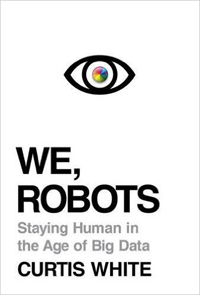 Curtis White, We, Robots: Staying Human in the Age of Big Data (Brooklyn: Melville House, 2015), 284pp.
Curtis White, We, Robots: Staying Human in the Age of Big Data (Brooklyn: Melville House, 2015), 284pp.
Curtis White doesn't identify himself as a Christian, but I read his book because I believe that it explores a deeply important aspect of living Christianly in our world today. In Romans 12:1–2, the apostle Paul calls us not to conform to the world but to be transformed. Don't let the world squeeze you into its mold. Martin Luther King, Jr. called this "transformed non-conformity." The gospel of John describes living very much in the world without being a worldly person. So, in the language of White's sub-title, we're called to live humanly in our inhuman world.
White has established himself as a cultural contrarian and a gadfly in a dozen or so books, and that has an inherent appeal to me. This book appears to be a re-packaging of material that previously appeared in magazines and journals; it isn't about big data per se. His overall thesis is a good one — human beings aren't just "Darwinian survivalists" whose only need is "adaptive fitness." We are "maximalists" who need meaningful narratives in order to flourish. Food, for example, is about community and sharing and not just nourishment; sex is about much more than pro-creation. Unfortunately, everywhere you turn in our culture, the stories and narratives are driven by what White calls techno-capitalism. He explores this in five different areas — economy, science, spirituality, nature, and art. In the last part of the book he urges us toward "something worth being loyal to."
This is a good and important message, but I found White's writing style to be a huge and irritating distraction. Satire is one thing, glib sarcasm and gross generalities are quite another. It would be nice if the world was as binary, as black and white, as he paints it, but reality is a lot more complex and ambiguous than he admits. For a better take on living counter-culturally in our technological society, I recommend the works of Jacques Ellul (his trilogy on technology), Jaron Lanier (Who Owns the Future?), Evgeny Morozov (To Save Everything, Click Here; The Folly of Technological Solutionism), and Dave Eggers (The Circle).


